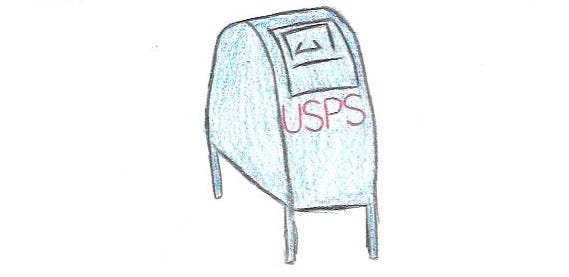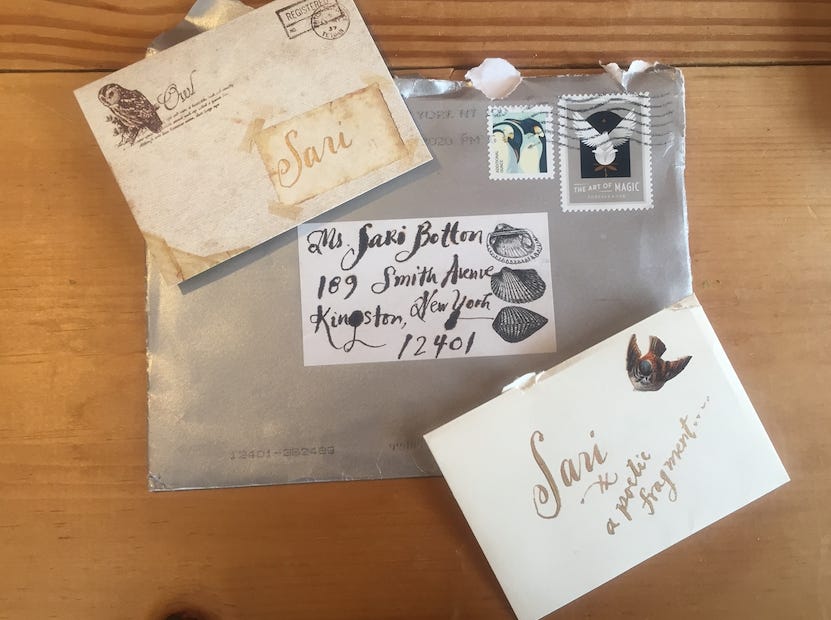
Between 7am and 8am each day last week I wrote letters and postcards to people who asked for them. After learning that the genocidal monster-in-chief rejected a proposal to bail out the United States Postal Service — threatening our ability to vote safely by mail in a pandemic — I’d posted on social media suggesting we all do our small part to save USPS by ordering a bunch of stamps and bringing back letter-writing. Anyone who DMed me their address would receive something from me via snail mail.
It wasn’t a 100 percent original idea. The week before I’d received mail from Laren Stover — a lovely note and “care package,” including stickers and vintage postcards, plus additional tiny notes — poetry — in tiny envelopes. It had lifted my spirits and reminded me of correspondences I’d enjoyed with camp friends and others decades ago.

It also reminded me of the brief period of my career during which I earned the most money I ever have — ironically, writing for the postal service.
📪📪📪
In the summer of 2002, a friend gave me a lucky break. She was a successful ad copywriter who’d just been hired by a digital agency to work on USPS.com, and they needed one more writer. She called me and suggested I apply.
Having never written ad copy before, I assumed it was a lost cause. I had no portfolio like my friend or other copywriters I knew, who’d worked at multiple agencies, and before that, taken classes a the School of Visual Arts, where they collaborated with art directors to create campaigns they could take on interviews. But my friend vouched for me, and I got the gig.
I needed a boost. I’d been doing okay, writing-wise, but still struggled financially. Even when I was at my busiest, freelance journalism was never terribly lucrative. I juggled numerous assignments, many of them at low pay rates. Occasionally I’d have a $2/word article or essay for a glossy magazine in the mix. But I never landed enough of those. And back then Conde Nast, Hearst, and Hachette were flush, and editors over-assigned; often they’d kill pieces out of the blue, even after they’d been edited and accepted.
The one that hurt the most: An essay I wrote for Glamour about cutting off my waist-length hair so I could donate it to Locks of Love — for which Conde Nast had paid for not one but three fancy shoots (before, during, and after hair-chopping) got postponed every month for a year, then ultimately never saw the light of day. When they finally decided to kill it, they wouldn’t let me have the photos so I could sell it elsewhere. (Obviously I couldn’t take before photos again.)

(Some Polaroids from the Glamour shoots. In the shot at bottom left, I am holding the cut-off ponytail and crying.^^^)
For years I’d dreamed of breaking into ad copy writing. The handful of friends I knew who did it made so much more money than I did. They bitched about it, saying it was “soul-sucking,” but they lived in bigger, nicer apartments than I did, had nicer things, went on fancy vacations, took shares in summer houses out east. I lived hand-to-mouth, and persistent anxiety about my survival often made it hard to sleep or concentrate.
💌💌💌
When I got the USPS.com gig I was thrilled, but anxious. The pay rate was nuts: I started out at $62.50/hour, and eventually moved up to $75/hour. I had never made so much money before, and I haven’t since.
Initially I suffered from acute impostor syndrome, worrying something would give away my lack of copywriting experience, and I’d get canned. But the job turned out to be ridiculously easy — so easy, I became concerned I might be doing it wrong, or that our bosses would realize the pay was crazily inflated considering how little effort the job required, and fire us.
We were tasked with re-writing the entire USPS.com site, which was something like more than 600 pages. But most of the pages required just one or two lines of copy — about the benefits of buying stamps online, or of their click-n-ship service, which allows you to print postage for packages and arrange to have them picked up. It was boring and tedious, but we were able to do it quickly. Too quickly, which meant there were many hours during which I had to try and look busy, or stealthily write freelance articles on the IBM clone they’d assigned me.
I felt so uncomfortable making that kind of money working so little. I talked to my friend about it, and she shared a justification I would later hear again from other copywriters at the few other gigs I landed afterward: Writing copy didn’t just take place in the time you wrote the few lines you did; it also took place in the hours when your unconscious mind was tossing ideas around which would come to you later. Also, the agencies were bringing in so much more money for the jobs than they were sharing with the writers, so every penny you managed to get out of them was justified.
This didn’t sit terribly well with me, and I became an anxious mess. It didn’t stop me from engaging in copywriting work on and off for the next two years, not just for USPS.com, but also for Maybelline.com (I won a Webby Award for my work on that site) and for the Limited brand New York & Company (I was hired to write a newsletter for designer Karen Harman, and to come up with names for pantyhose colors). But, yeah, now I got what my friends meant by “soul-sucking.”
Losing our apartment and moving upstate in 2005 put an end to my copywriting opportunities, and although I missed the money, I didn’t miss the uncomfortable feelings I had about that work. (The money I was able to save made up a big portion of the downpayment on our house.)
🌟🌟🌟
Ironically, during the time I was working on USPS.com, Time Out NY gave me an assignment to write about how the mail system works in NYC. In addition to touring the big mail processing facility in Manhattan, I was asked to shadow my mail carrier for a day.
I knew my mail carrier to be a friendly, jovial guy, so I figured the assignment would be kind of fun. So there I was one morning, hanging out as Joe sorted the mail at the 10003 Post Office. Joe’s sorting station was next to a wall, which was covered entirely…with Joe’s porn. Like, graphic porn. I tried to avert my eyes, but Joe caught me noticing it. “Yeah,” he said, “my lady co-workers are none too happy about this. But it sure makes my day go faster.”
I was stunned. I really didn’t want to engage with him about it, but I had a hard time believing you were allowed to hang porn on the property of the United States Postal Service. I had to ask. “They let you do that?”
“No,” he answered, shaking his head. “No, they do not! I have to have another meeting with my supervisors about it. They keep telling me I have to take it down. Well, we’ll see what they do.”
As you can probably imagine, this made my afternoon walking from door to door with Joe rather awkward — not to mention every time I saw him thereafter.
As we snaked up and down the streets of the East Village, Joe schlepping two heavy mailbags on his shoulders, I tried to focus on other observations. Joe talked about problems with his back, neck and knees. About how he tried to log as much overtime as he could to be able to make ends meet. “I almost never take off,” he said. “I can’t afford to.”
He confessed he hoped they’d fire him for the porn so he could sue them for impinging on his first amendment rights, and then live off the ensuing financial windfall.
The more we talked, the more wrong it felt for me to be making such insane money for writing puns about certified mail when this guy was breaking his back, literally, for barely enough money to live an hour away, near Kennedy Airport. It seemed so fucked up that there was all this money budgeted for the website, a white collar grift, but so little for the blue collar employees doing the really hard work.
Granted, I didn’t feel bad enough to quit. But I never worked another day on that website without thinking of Joe and the lopsidedness, the injustice, of our different pay scales.


